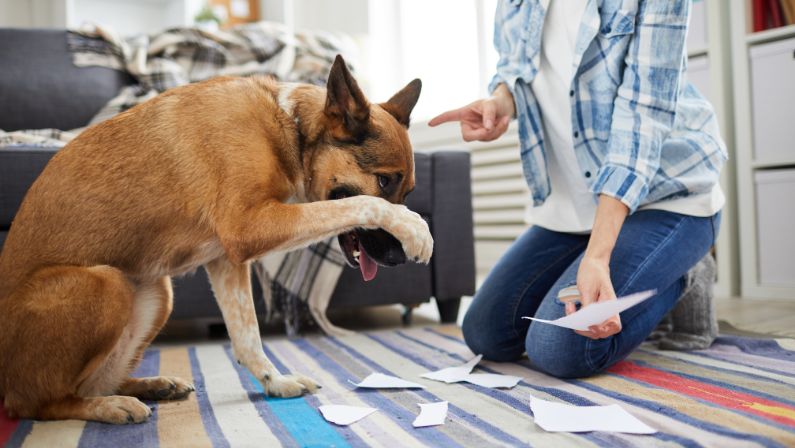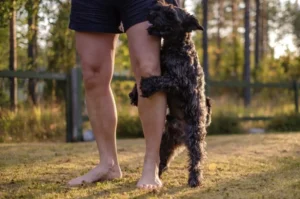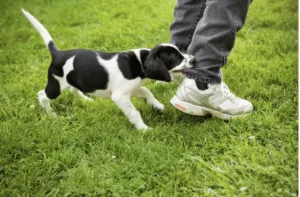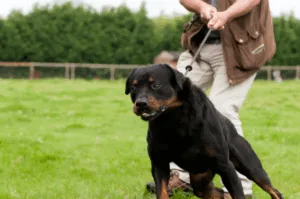Dogs are famously known as man’s best friend, and for good reason. They are loyal, loving and often form strong bonds with their human companions. However, like humans, dogs can sometimes exhibit challenging behaviors that strain this special relationship.
In this article, we will provide a brief overview of common dog behavior issues and discuss the importance of addressing these issues to maintain a harmonious relationship with your dog.
Common Dog Behavior Issues
As a dog owner, it’s essential to understand and address common dog behavior issues to ensure a harmonious and happy relationship with your furry friend. In this blog, we will discuss three common issues found among dogs: barking, jumping, and chewing.
We will explore the reasons behind these behaviors and provide practical tips on managing and correcting them.

Barking
Common Causes of Barking
- Attention-seeking: Dogs may bark to get their owner’s attention, whether for food, play, or affection.
- Boredom: A lack of physical and mental stimulation can lead to excessive barking as an outlet for pent-up energy.
- Fear or anxiety: Dogs may bark when they are frightened or anxious, such as during thunderstorms, fireworks, or when encountering unfamiliar people or animals.
- Territorial behavior: Dogs may bark to protect their territory or assert dominance when they perceive a threat, such as another dog or person approaching their home.
- Separation anxiety: Dogs suffering from separation anxiety may bark excessively when left alone, often accompanied by other destructive behaviors.
Solutions for Excessive Barking
- Exercise and mental stimulation: Ensuring your dog gets plenty of physical activity and mental stimulation through walks, playtime, and puzzle toys can help alleviate boredom and reduce barking.
- Training and positive reinforcement: Teaching your dog the “quiet” command and rewarding them for obeying can help establish boundaries and control their barking. Avoid yelling at your dog, as this can inadvertently reinforce the behavior.
- Socialization: Exposing your dog to various environments, people, and animals can help reduce fear and anxiety-related barking by building their confidence and comfort in different situations.
- Addressing separation anxiety: If your dog’s barking is related to separation anxiety, consider crate training, using calming aids, or seeking professional help from a veterinarian or behaviorist.
- Environmental management: Using tools such as white noise machines, window coverings, or barriers can help minimize triggers that cause your dog to bark.

Jumping
Common Causes of Jumping
- Excitement: Dogs often jump when they are excited, such as during greetings or playtime.
- Attention-seeking: Jumping can be a way for dogs to get their owner’s attention or to engage with other dogs or people.
- Lack of impulse control: Some dogs have difficulty controlling their excitement and may jump impulsively.
- Reinforcement: If jumping has been rewarded in the past, either intentionally or unintentionally, dogs may continue the behavior to receive the same response.
Solutions for Jumping
Here are some tips for dealing with jumping:
- Training and positive reinforcement: Teach your dog to sit or stay when greeting people or in situations that trigger jumping. Reward them with praise, treats, or affection when they remain calm and keep all four paws on the ground.
- Ignore the behavior: If your dog jumps on you for attention, turn away and ignore them until they stop. Once they have calmed down, reward them with the attention they were seeking.
- Consistency: Ensure that all household members and visitors follow the same rules when interacting with your dog to prevent mixed signals and confusion.
- Exercise and mental stimulation: Providing your dog with plenty of physical activity and mental stimulation can help reduce excess energy and the likelihood of impulsive jumping.
- Professional help: If your dog’s jumping behavior is particularly challenging, consider seeking the assistance of a professional dog trainer or behaviorist.

Chewing
Common Causes of Chewing
- Teething: Puppies undergo a teething phase, during which chewing can relieve the discomfort of growing new teeth.
- Boredom: Dogs may chew on inappropriate objects when they are bored or lack mental stimulation.
- Stress or anxiety: Chewing can be a coping mechanism for dogs experiencing stress or anxiety, helping them soothe and relax.
- Hunger: A dog on a poor diet or with a high metabolism may chew on objects in an attempt to find additional sources of nutrition.
- Lack of appropriate chew toys: A dog needs access to suitable chew toys to avoid resorting to chewing on household items or furniture.
Solutions for Destructive Chewing
- Provide appropriate chew toys: Offer a variety of safe and durable chew toys for your dog to satisfy their natural chewing instincts. Rotate the toys regularly to maintain your dog’s interest.
- Exercise and mental stimulation: Ensure your dog has plenty of physical and mental stimulation opportunities through walks, playtime, and puzzle toys to help prevent boredom-related chewing.
- Dog-proof your home: Keep valuable or dangerous items out of your dog’s reach and consider using deterrent sprays on furniture or other objects you want to protect from chewing.
- Address stress or anxiety: Identify and address potential sources of stress or anxiety in your dog’s environment. Consult with a veterinarian or behaviorist for additional guidance and support if necessary.
- Training and positive reinforcement: Teach your dog the “leave it” or “drop it” command to help them understand which items are off-limits for chewing. Praise and reward your dog when they chew on appropriate toys instead of forbidden objects.
Conquering Barking, Jumping, and Chewing for a Happier Home
Managing common dog behavior issues such as barking, jumping, and chewing requires patience, consistency, and a solid understanding of the underlying causes. By implementing appropriate training techniques, providing ample exercise and mental stimulation, and addressing any stress or anxiety your dog may be experiencing, you can create a more harmonious and enjoyable living environment for both you and your canine companion.
If you’re looking for professional guidance and support in addressing these behaviors, consider reaching out to us at K9 Mania Dog Training. Their team of experienced dog trainers and behaviorists are dedicated to helping you and your dog develop a strong bond based on trust, communication, and mutual respect.
With K9 Mania Dog Training’s expertise, you’ll be well-equipped to conquer barking, jumping, and chewing, paving the way for a happier and more peaceful home. Don’t wait – contact K9 Mania Dog Training today and take the first step toward a well-behaved and content canine companion.






